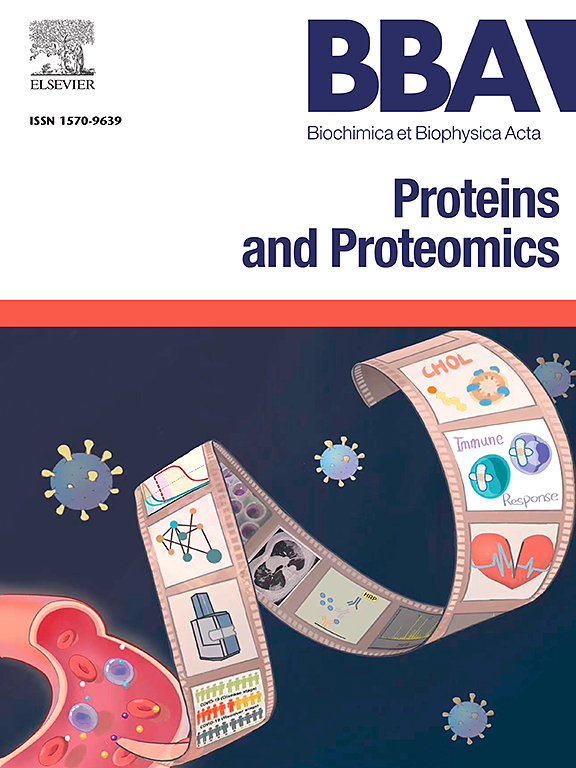Parishin C modulates the amyloid transformation of alpha-synuclein protein by apparently interacting with the NAC domain
IF 2.3
4区 生物学
Q3 BIOCHEMISTRY & MOLECULAR BIOLOGY
Biochimica et biophysica acta. Proteins and proteomics
Pub Date : 2025-05-07
DOI:10.1016/j.bbapap.2025.141076
引用次数: 0
Abstract
Parkinson's disease (PD) is a neurodegenerative disorder marked by the gradual deterioration of dopaminergic neurons in the brain and the presence of Lewy bodies (LB) within the remaining affected neurons, comprised of α-synuclein protein aggregates. Herein, we report a novel amyloid inhibitory potential of Parishin C on the amyloid transformation of the α-synuclein protein. Our studies involving computational screening and REMD simulation analysis revealed a strong interaction between Parishin C and the non-amyloid component (NAC domain), a known aggregation-prone region of the α-synuclein protein. Thioflavin T fluorescence assay demonstrated the inhibitory effect of Parishin C on amyloid transformation kinetics of α-synuclein, where even at the lowest concentration of Parishin C there was a 72 % reduction in the ThT maxima. ANS binding assay further revealed its ability to alter the surface hydrophobicity of the protein. An extensive evaluation using biophysical techniques indicated that Parishin C effectively prevented the formation of mature fibrillar species and promoted the formation of lower order aggregates with reduced cross-β-sheet signatures compared to the native α-synuclein aggregates. Collectively, our research highlights Parishin C's potential as a structural blueprint for developing new therapeutic compounds aimed at preventing the amyloidogenic transition in Parkinson's disease and related disorders.

Parishin C通过与NAC结构域的明显相互作用调节α -突触核蛋白的淀粉样蛋白转化
帕金森氏病(PD)是一种神经退行性疾病,其特征是大脑中多巴胺能神经元逐渐退化,剩余受影响的神经元中存在路易小体(LB),由α-突触核蛋白聚集体组成。在此,我们报道了Parishin C对α-突触核蛋白淀粉样蛋白转化的一种新的淀粉样蛋白抑制潜力。我们的研究包括计算筛选和REMD模拟分析,发现Parishin C和非淀粉样成分(NAC结构域)之间有很强的相互作用,NAC结构域是α-突触核蛋白的一个已知的容易聚集的区域。硫黄素T荧光实验表明,Parishin C对α-突触核蛋白淀粉样蛋白转化动力学有抑制作用,即使在最低浓度的Parishin C下,ThT最大值也降低了72%。ANS结合实验进一步揭示了其改变蛋白表面疏水性的能力。利用生物物理技术进行的广泛评估表明,与天然α-synuclein聚集体相比,Parishin C有效地阻止了成熟纤维物种的形成,并促进了低阶聚集体的形成,其交叉β-片特征减少。总的来说,我们的研究突出了Parishin C作为开发新的治疗化合物的结构蓝图的潜力,旨在预防帕金森病和相关疾病的淀粉样变性。
本文章由计算机程序翻译,如有差异,请以英文原文为准。
求助全文
约1分钟内获得全文
求助全文
来源期刊
CiteScore
8.00
自引率
0.00%
发文量
55
审稿时长
33 days
期刊介绍:
BBA Proteins and Proteomics covers protein structure conformation and dynamics; protein folding; protein-ligand interactions; enzyme mechanisms, models and kinetics; protein physical properties and spectroscopy; and proteomics and bioinformatics analyses of protein structure, protein function, or protein regulation.

 求助内容:
求助内容: 应助结果提醒方式:
应助结果提醒方式:


